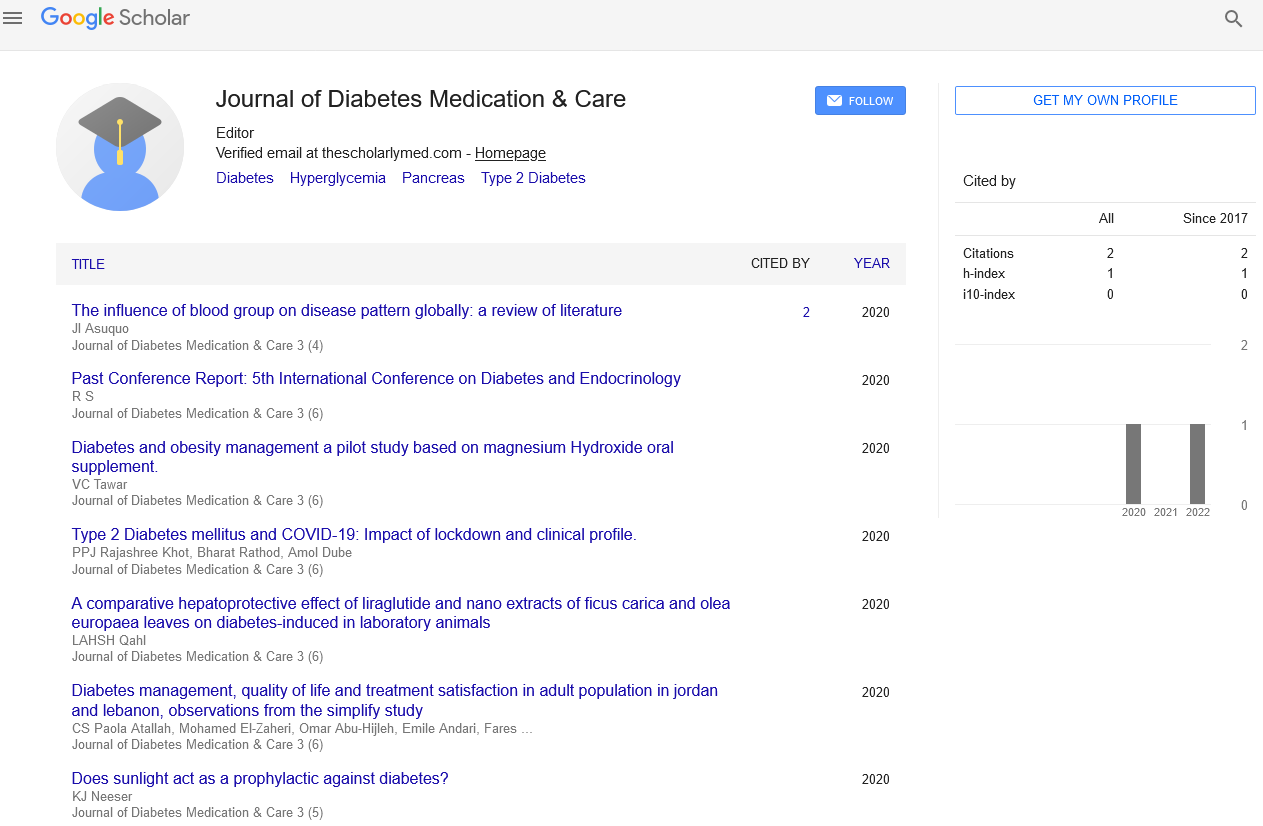Perspective - Journal of Diabetes Medication & Care (2024) Volume 7, Issue 5
Artificial Intelligence in Diabetes Management: Transforming Care Through Technology
- Corresponding Author:
- Michael Murpy
Department of Diabetes and Endocrinology, University of Havana, Havana, Cuba
E-mail: michelmurphy@ubc.ca
Received: 02-Sep-2024, Manuscript No. JDMC-24-148356; Editor assigned: 05-Sep-2024, PreQC No. JDMC-24-148356 (PQ); Reviewed: 19-Sep-2024, QC No. JDMC-24-148356; Revised: 17-Oct-2024, Manuscript No. JDMC-24-148356 (R); Published: 24-Oct-2024, DOI: 10.37532/JDMC.2024.7(5).266-268
Introduction
Diabetes is a global health crisis affecting over 537 million adults worldwide, and this number is projected to rise significantly in the coming years. Effective management of diabetes is critical to preventing complications such as heart disease, kidney failure, and neuropathy. Traditionally, diabetes management has relied on self-monitoring of blood glucose levels, dietary control, and medication adherence. However, the advent of Artificial Intelligence (AI) is revolutionizing how we approach diabetes care, offering innovative solutions that enhance monitoring, treatment personalization, and patient engagement. This article explores the role of AI in diabetes management, highlighting its applications, benefits, challenges, and future prospects.
Description
Understanding AI and its relevance to diabetes management
Artificial intelligence encompasses a range of technologies that enable machines to perform tasks that typically require human intelligence, such as learning, reasoning, and problem-solving. In the context of diabetes management, AI can analyze vast amounts of data from various sources-such as Continuous Glucose Monitors (CGMs), wearables, Electronic Health Records (EHRs), and patient-reported outcomes to generate insights that support clinical decision making.
Key applications of AI in diabetes management
Personalized treatment plans: AI algorithms can analyze individual patient data, including demographics, medical history, lifestyle factors, and glucose patterns, to create personalized treatment plans. By using machine learning techniques, these algorithms can identify optimal insulin dosing regimens, dietary recommendations, and exercise programs tailored to each patient’s unique needs. This personalized approach not only improves glycemic control but also enhances patient satisfaction and adherence.
Predictive analytics: Predictive analytics in diabetes management involves using historical data to forecast future events. AI systems can predict episodes of hypoglycemia or hyperglycemia by analyzing patterns in a patient’s blood glucose levels and contextual factors such as food intake and physical activity. Early warning systems can alert patients and healthcare providers, allowing for timely interventions that prevent adverse outcomes.
Continuous Glucose Monitoring (CGM) integration: Continuous glucose monitoring has transformed diabetes management by providing real-time data on glucose levels. AI can enhance the utility of CGMs by analyzing the data to identify trends and patterns. For instance, AI algorithms can detect when a patient’s glucose levels are trending upwards or downwards and provide actionable recommendations. Some CGM systems equipped with AI capabilities can even automate insulin delivery in insulin pump systems, creating a closed loop system that adjusts insulin in real time based on glucose levels.
Telehealth and virtual coaching: AI-powered telehealth platforms allow for remote monitoring and consultation, making diabetes care more accessible. These platforms can analyze patient data and provide personalized coaching and feedback. For example, an AI system can remind patients about medication adherence, dietary choices, or lifestyle changes based on their activity patterns and health data. Virtual coaching enhances patient engagement and fosters a proactive approach to diabetes management.
Clinical Decision Support Systems (CDSS): AI driven CDSS can assist healthcare providers in making informed clinical decisions. By analyzing a patient’s complete medical history and current health data, these systems can suggest evidence based treatment options, alert providers to potential drug interactions, and identify patients at risk of complications. This support not only enhances the quality of care but also reduces the cognitive load on healthcare professionals.
Benefits of AI in diabetes management
Improved glycemic control: One of the most significant benefits of AI in diabetes management is the potential for improved glycemic control. Personalized treatment plans and predictive analytics can lead to more stable blood glucose levels, reducing the risk of both acute and chronic complications.
Enhanced patient engagement: AI technologies promote greater patient engagement by providing real-time feedback and personalized recommendations. Patients who feel more involved in their care are more likely to adhere to treatment plans and make healthier lifestyle choices.
Efficient resource allocation: By automating routine tasks such as data analysis and monitoring, AI allows healthcare providers to focus on higher value activities, such as patient education and counseling. This efficiency can help address the growing demand for diabetes care in the face of physician shortages.
Reduced healthcare costs: Effective diabetes management facilitated by AI can lead to fewer hospitalizations and complications, ultimately reducing healthcare costs. Early interventions based on predictive analytics can prevent costly emergency room visits and long-term care needs.
Challenges and limitations
While the potential of AI in diabetes management is promising, several challenges and limitations must be addressed:
Data privacy and security: The use of AI involves collecting and analyzing sensitive health data, raising concerns about data privacy and security. Ensuring that patient data is protected from breaches and unauthorized access is paramount for building trust in AI technologies.
Integration with existing systems: Integrating AI tools into existing healthcare systems can be complex. Healthcare providers may face challenges in adapting to new technologies, and interoperability between AI systems and EHRs must be ensured to facilitate seamless data sharing.
Equity and access: There is a risk that AI-driven solutions may not be accessible to all patients, particularly those in underserved communities or with limited technological literacy. Ensuring equitable access to AI technologies is essential for maximizing their benefits.
Need for validation and regulation: AI algorithms must be rigorously validated to ensure their accuracy and effectiveness in clinical settings. Regulatory frameworks will need to evolve to address the unique challenges posed by AI in healthcare, ensuring that these technologies meet safety and efficacy standards.
Future directions
The future of AI in diabetes management holds exciting possibilities. Several key areas are poised for growth and innovation:
Enhanced machine learning techniques: As machine learning algorithms continue to advance, they will become increasingly adept at identifying complex patterns in patient data. This could lead to even more personalized treatment recommendations and improved predictive capabilities.
Integration with wearable technology: The integration of AI with wearable devices such as smartwatches and fitness trackers could provide a comprehensive view of a patient’s health. Continuous monitoring of physical activity, sleep patterns, and stress levels, combined with glucose data, could offer valuable insights into overall well-being and diabetes management.
Collaborative AI solutions: Future AI solutions may involve collaborative approaches that integrate input from patients, healthcare providers, and researchers. By harnessing collective expertise, these solutions can enhance the accuracy and relevance of AI-driven recommendations.
Real world evidence generation: AI can facilitate the generation of real-world evidence by analyzing data from diverse patient populations and healthcare settings. This evidence can inform best practices and treatment guidelines, ensuring that diabetes management strategies are grounded in real world experiences.
Conclusion
Artificial intelligence is transforming diabetes management by enhancing personalized care, improving glycemic control, and increasing patient engagement. As technology continues to evolve, the integration of AI into diabetes care has the potential to create a more efficient, effective, and patient centered healthcare system. However, addressing challenges related to data privacy, access, and regulatory oversight is essential for realizing the full benefits of AI. By embracing this technological revolution, we can improve outcomes for millions of individuals living with diabetes, ultimately leading to a healthier future.

